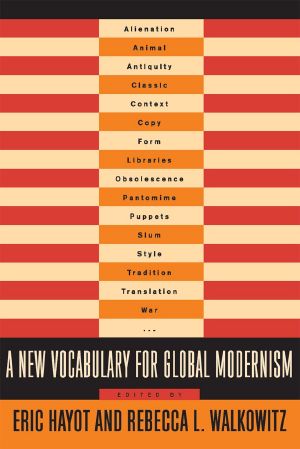A New Vocabulary for Global Modernism

- Authors
- Hayot, Eric
- Publisher
- Columbia University Press
- Tags
- literary criticism , semiotics & theory , reference , hayo16520 , lit006000 , lit012000
- ISBN
- 9780231165204
- Date
- 2016-11-29T00:00:00+00:00
- Size
- 12.61 MB
- Lang
- en
Bringing together leading critics and literary scholars, A New Vocabulary for Global Modernism argues for new ways of understanding the nature and development of twentieth-century literature and culture. Scholars have largely understood modernism as an American and European phenomenon. Those parameters have expanded in recent decades, but the incorporation of multiple origins and influences has often been tied to older conceptual frameworks that make it difficult to think of modernism globally. Providing alternative approaches, A New Vocabulary for Global Modernism introduces pathways through global archives and new frameworks that offer a richer, more representative set of concepts for the analysis of literary and cultural works.In separate essays each inspired by a critical term, this collection explores what happens to the foundational concepts of modernism and the methods we bring to modernist studies when we approach the field as a global phenomenon....
Eric Hayot is professor of comparative literature and Asian studies at the Pennsylvania State University. He is the author of The Elements of Academic Style (Columbia, 2014), On Literary Worlds (2012), and The Hypothetical Mandarin (2009). Rebecca L. Walkowitz is professor of English and affiliate faculty in the comparative literature program at Rutgers University. Her books are Born Translated: The Contemporary Novel in an Age of World Literature (2015) and Cosmopolitan Style: Modernism Beyond the Nation (2006), both published by Columbia University Press.
Bringing together leading critics and literary scholars, A New Vocabulary for Global Modernism argues for new ways of understanding the nature and development of twentieth-century literature and culture.
Bringing together leading critics and literary scholars, A New Vocabulary for Global Modernism argues for new ways of understanding the nature and development of twentieth-century literature and culture. Scholars have largely understood modernism as an American and European phenomenon. Those parameters have expanded in recent decades, but the incorporation of multiple origins and influences has often been tied to older conceptual frameworks that make it difficult to think of modernism globally. Providing alternative approaches, A New Vocabulary for Global Modernism introduces pathways through global archives and new frameworks that offer a richer, more representative set of concepts for the analysis of literary and cultural works.
In separate essays each inspired by a critical term, this collection explores what happens to the foundational concepts of modernism and the methods we bring to modernist studies when we approach the field as a global phenomenon. Their work transforms the intellectual paradigms we have long associated with modernism, such as tradition, antiquity, style, and translation. New paradigms, such as context, slum, copy, pantomime, and puppets emerge as the archive extends beyond its European center. In bringing together and reexamining the familiar as well as the emergent, the contributors to this volume offer an invaluable and original approach to studying the intersection of world literature and modernist studies.